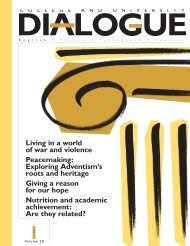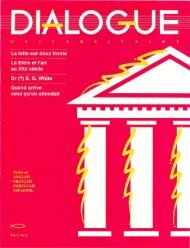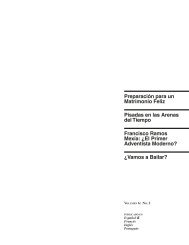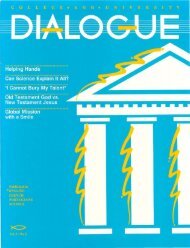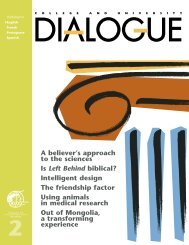Faith, reason, and the educated Christian Creationism - College and ...
Faith, reason, and the educated Christian Creationism - College and ...
Faith, reason, and the educated Christian Creationism - College and ...
You also want an ePaper? Increase the reach of your titles
YUMPU automatically turns print PDFs into web optimized ePapers that Google loves.
a global, multicultural body such as <strong>the</strong><br />
Adventist Church, wherever we worship,<br />
<strong>the</strong> same principles must guide our<br />
underst<strong>and</strong>ing of what worship is. Derived<br />
from <strong>the</strong> Word of God, <strong>the</strong>y are<br />
unchangeable <strong>and</strong> eternal, independent<br />
of time or place. Where we diverge is in<br />
our expressions of worship, in how we<br />
worship. We need to determine what attitudes,<br />
shaped by our culture, will best<br />
express reverence. Here, <strong>the</strong> real question<br />
is: “Will this particular mode of expression<br />
within a given culture truly be understood<br />
as expressing reverence to<br />
God?”<br />
The same is true for joyfulness. There<br />
are different ways of being joyful. Some<br />
jump <strong>and</strong> shout, o<strong>the</strong>rs are quietly joyful.<br />
Whatever culture we live in, we<br />
need to discover <strong>the</strong> most truthful way<br />
to express <strong>the</strong> joy that comes from biblical<br />
worship. What kind of joy should we<br />
expect to experience in worship? Is<br />
<strong>the</strong>re a difference between <strong>the</strong> kind of<br />
joy we experience in worship <strong>and</strong> <strong>the</strong><br />
celebration we experience at a football<br />
game or music event? The joy that<br />
comes from worship is very special <strong>and</strong><br />
not common. It is in some way similar<br />
to our human joys, but it is also very different.<br />
Nehemiah’s account of <strong>the</strong> dedication<br />
of <strong>the</strong> walls of Jerusalem after Israel’s<br />
return from <strong>the</strong> exile says that<br />
<strong>the</strong>y were “rejoicing because God had<br />
given <strong>the</strong>m great joy” (Nehemiah 12:43,<br />
NIV). Thus joyfulness in worship is a<br />
God-given joy, <strong>the</strong> result of our encounter<br />
with Him <strong>and</strong> of what He has done<br />
for us. Our quest for this God-given joy<br />
is very important because it will shape<br />
our expressions of worship: <strong>the</strong> way we<br />
behave during worship, <strong>the</strong> music we<br />
do, <strong>and</strong> how we do that music.<br />
Form <strong>and</strong> content go h<strong>and</strong> in h<strong>and</strong>,<br />
in worship as well as in every art form.<br />
Just as in art, so in worship: If <strong>the</strong> message<br />
transmitted by <strong>the</strong> form is not <strong>the</strong><br />
same as that carried by <strong>the</strong> content, we<br />
will end up in false art or false worship.<br />
The image of pipe <strong>and</strong> water illustrates<br />
<strong>the</strong> issue of cultural expression. While<br />
pipes may be of different materials—<br />
metal, plastic, cement—<strong>the</strong>y all can<br />
convey water. Similarly, different cultural<br />
expressions can convey a particular<br />
truth. One thing, however, is important:<br />
We must ensure that when <strong>the</strong> water<br />
comes down to us <strong>and</strong> when we drink of<br />
it, it is still <strong>the</strong> pure, unadulterated water,<br />
<strong>the</strong> truth. If this water changes in its<br />
chemical composition, it can become a<br />
poison. Certain channels or pipes can<br />
change <strong>the</strong> nature of <strong>the</strong> water. If I use a<br />
lead pipe to transport my water, <strong>the</strong> water<br />
will ultimately pick up enough lead<br />
to make me sick. The essential of life can<br />
become a cause of sickness. If our form<br />
of worship in some way adulterates <strong>the</strong><br />
message we want to convey, it is not an<br />
appropriate form of worship <strong>and</strong> we<br />
need to change it. On <strong>the</strong> o<strong>the</strong>r h<strong>and</strong>, if<br />
it conveys truthfully <strong>the</strong> message of<br />
worship, even if it is not <strong>the</strong> traditional<br />
form, <strong>the</strong>n it is an appropriate form for<br />
worship.<br />
One of <strong>the</strong> difficult realities of worship<br />
is that it comes with a tension, as<br />
we have noted: between <strong>the</strong> human<br />
partner <strong>and</strong> <strong>the</strong> divine partner in worship;<br />
between expressions of joy <strong>and</strong><br />
reverence; <strong>and</strong> between appropriateness<br />
<strong>and</strong> relevance. It is a healthy tension<br />
because it constantly challenges us in<br />
our worship. This tension requires that<br />
we spare no effort to find a sound balance<br />
between <strong>the</strong> two elements. This<br />
task cannot be done by one person<br />
alone; it takes <strong>the</strong> entire congregation to<br />
ensure that our worship is pleasing to<br />
God.<br />
In <strong>the</strong> perspective of this tension,<br />
any discussion about forms <strong>and</strong> formats<br />
of worship takes on a new direction.<br />
The issue is no longer to choose between<br />
styles—which would mean that <strong>the</strong>re<br />
are some styles better than o<strong>the</strong>rs—but<br />
to make choices within a given style. A<br />
multiplicity of styles is available for<br />
proper worship, <strong>and</strong> within each style<br />
we must choose those elements that appropriately<br />
convey true worship values.<br />
The questions are not: Is it O.K. to<br />
clap in worship? Is this style of music<br />
acceptable? Should we use drama in<br />
worship? Should we kneel or st<strong>and</strong> for<br />
prayer? Forms <strong>and</strong> formats of worship<br />
are not <strong>the</strong> goal or purpose of worship.<br />
They are now results <strong>and</strong> consequences<br />
of our reflection on worship. At this<br />
point, new questions will arise <strong>and</strong> govern<br />
our quest for true worship:<br />
• How can we capture a sense of holiness<br />
in worship?<br />
• How can we shape <strong>the</strong> worship<br />
service so that <strong>the</strong> worshiper is led<br />
to focus on God ra<strong>the</strong>r than on<br />
<strong>the</strong> music or <strong>the</strong> preaching?<br />
• How can we express joy <strong>and</strong> reverence<br />
in worship <strong>and</strong> maintain a<br />
balance between <strong>the</strong> two?<br />
• What worship expressions can<br />
help <strong>the</strong> congregation to become<br />
better practitioners of <strong>the</strong>ir faith,<br />
i.e., practice mercy <strong>and</strong> justice, <strong>the</strong><br />
signs of true worship?<br />
• How can our worship service communicate<br />
our message to <strong>the</strong><br />
world?<br />
We need to relearn how to worship.<br />
The secret to achieve this is to relearn<br />
how to connect with God on a personal<br />
level. Corporate worship starts on <strong>the</strong><br />
level of personal worship. As we learn to<br />
know Him better, <strong>and</strong> how to come<br />
closer to Him, as we learn how to address<br />
ourselves to Him <strong>and</strong> how to relate<br />
to our fellow worshipers, we will discover<br />
how to make our worship services<br />
more meaningful.<br />
Lilianne Doukhan (Ph.D., Michigan<br />
State University) teaches musicology <strong>and</strong><br />
Music <strong>and</strong> Worship at Andrews University,<br />
in Berrien Springs, Michigan. She is currently<br />
working on a book on worship <strong>and</strong> music.<br />
Her e-mail: ldoukhan@<strong>and</strong>rews.edu.<br />
Dialogue 15:3 2003<br />
19




